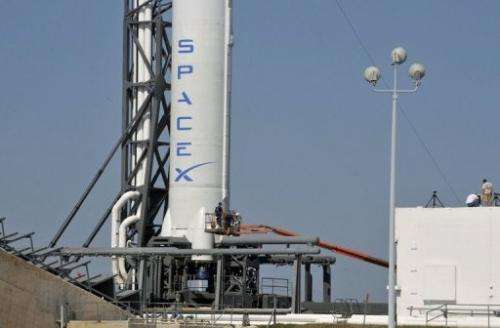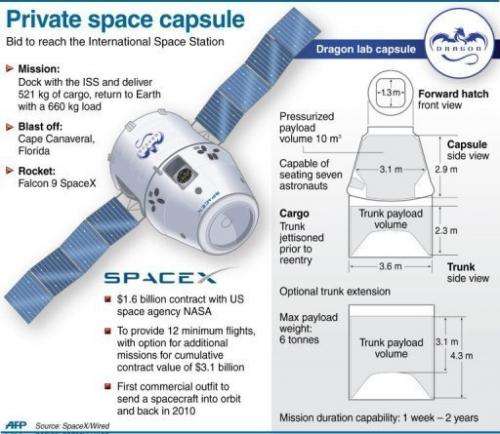SpaceX rocket launch aborted in last half-second (Update)

Engineers aborted the launch of a privately built spacecraft on a landmark mission to the International Space Station at the last second Saturday due to a rocket engine problem.
The California-based company SpaceX scrubbed the launch of its Dragon capsule a half-second before liftoff after an engine controller noted high pressure in the central engine of the Falcon 9 rocket, forcing the shutdown.
"This is not failure. We aborted with purpose. It would be a failure if we were to have lifted off with an engine trending in this direction," SpaceX president Gwynne Shotwell told reporters.
"We will be out there looking for whatever we can find and we will put out a statement as soon as we find a root cause," Shotwell said, adding that early indications have ruled out a sensor failure or a faulty fuel valve.
All nine engines are required for a successful liftoff, though up to two engines can be lost in flight.
Elevated temperatures could have caused the high pressure in engine five, possibly from too little fuel flowing into it, though it is too early to know for certain.
"We're going to have to spend more time looking at the data," Shotwell said, warning it could take several days to replace the defective engine.
While SpaceX has a next launch opportunity on Tuesday at 3:44 am (0744 GMT), the date of the next attempt will remain uncertain until inspectors determine the root cause of the engine problem.
Another launch window opens up on Wednesday at 3:22 am (0722 GMT).
A similar issue with engine five forced a temporary delay of the Falcon 9's first-ever flight, but that liftoff was not scrubbed because there was a longer launch window and SpaceX was able to renew the attempt, Shotwell said.
However, this time there was a very narrow window of opportunity to launch toward the ISS so the attempt was put off entirely.
SpaceX founder Elon Musk initially downplayed the problem, saying in a tweet that there was "slightly high" combustion chamber pressure. But Shotwell said his statement was based on early data.
"Further analysis of the data we were able to get it looks like it is something we want to go and inspect," she added.
NASA urged patience for what would mark the first attempt to send a privately built spacecraft to the orbiting research outpost.
"We're ready to support when SpaceX is ready to go," said Alan Lindenmoyer, NASA's manager of the Commercial Crew and Cargo Program.

SpaceX is the first of several US competitors to try sending its own cargo-bearing spacecraft to the ISS with the goal of restoring US access to space for human travelers by 2015.
The company made history with its Dragon launch in December 2010, becoming the first commercial outfit to send a spacecraft into orbit and back.
Until now, only the space agencies of Russia, Japan and Europe have been able to send supply ships to the ISS.
The United States had that capacity too, with its iconic space shuttle that long served as part astronaut bus, part delivery truck for the lab.
But the 30-year shuttle program ended for good in 2011, leaving Russia as the sole taxi for astronauts to the ISS until private industry comes up with a replacement.
SpaceX has benefited from NASA dollars in its quest but has also poured its own money into the project.
SpaceX and Orbital Sciences Corporation both have billion-dollar contracts with NASA to supply cargo to the ISS in the coming years.
The US space agency has given SpaceX about $390 million so far of the total $680 million that the California-based company has spent on cargo development, according to Shotwell.
SpaceX also gets funding from NASA on a separate effort to develop a commercial crew vehicle for carrying astronauts to space, along with competitors Blue Origin, Boeing and Sierra Nevada.
In a few years' time, Shotwell said she hopes SpaceX will be able to undercut the hefty price NASA pays Russia for US astronauts to get a seat aboard the Soyuz space capsule -- around $63 million a ticket.
(c) 2012 AFP





















